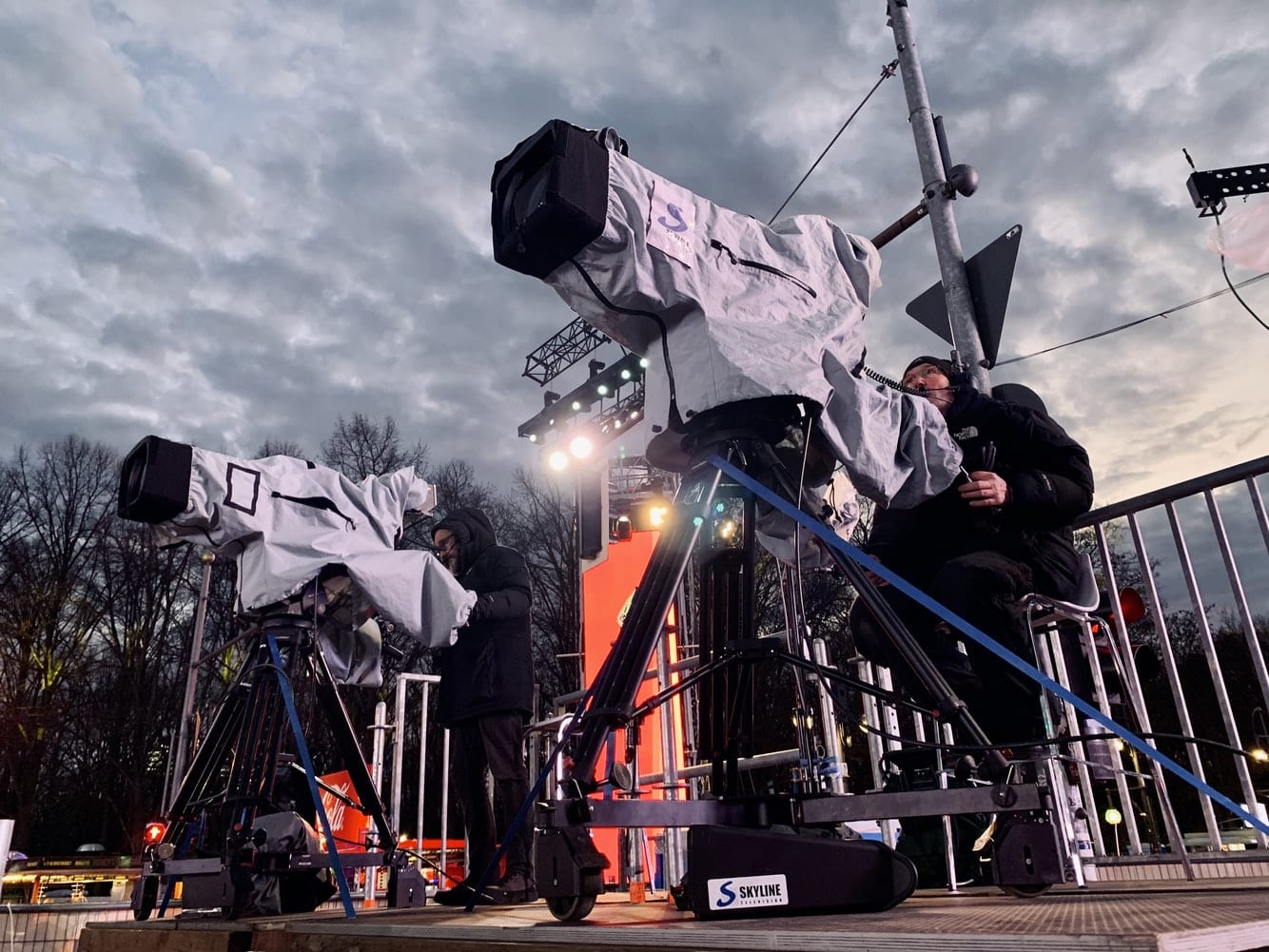Comprehending Event Production: Why It Is Very Important for Successful Celebrations
Event production plays an essential function in forming effective events. It entails cautious planning, sychronisation, and implementation to ensure every information straightens with the event's vision. This process not just improves guest experiences however also assists in significant connections amongst participants. Recognizing the complexities of event production can greatly influence the general result. What are the crucial elements that add to a successful event, and how can they be effectively managed?
The Duty of Event Production in Creating Remarkable Experiences
Several elements contribute to the success of an occasion, event production plays a pivotal function in crafting unforgettable experiences. This complex process encompasses numerous components, including preparation, logistics, and execution. Effective event production warranties that every information lines up with the overall vision, developing a seamless circulation that mesmerizes guests. By working with timelines, managing resources, and looking after technological elements, event producers develop a foundation for impactful experiences.Moreover, they curate settings that reverberate with the target audience, enhancing involvement and emotional link. From choosing appropriate locations to integrating innovative technology, the selections made during production significantly affect exactly how guests regard and bear in mind the event. By prioritizing high quality and focus to information, event production changes normal events right into remarkable minutes, leaving lasting impacts. Inevitably, the skilled orchestration of these elements specifies the essence of an event, showcasing the importance of expert event production in attaining remarkable outcomes.
Key Components of Effective Event Production
Reliable event production hinges on a number of crucial components that ensure success. Planning and control develop a strong foundation, while technical configuration needs resolve logistical needs. Furthermore, implementing audience engagement methods boosts the total experience, making the event memorable.
Preparation and Coordination
Preparation and coordination work as the foundation of effective event production, guaranteeing that every information aligns flawlessly to create a memorable experience. Effective preparation involves establishing a clear vision and objectives, while control entails the careful company of logistics, schedules, and resources. A well-defined timeline is important, assisting all stakeholders via critical landmarks and tasks. Communication plays a pivotal role, cultivating cooperation among employee, suppliers, and place personnel. Routine conferences and updates help to attend to difficulties quickly, guaranteeing that every person remains straightened with the event objectives. Inevitably, a structured strategy to planning and sychronisation not only enhances performance yet also considerably adds to the total success and enjoyment of the event for guests and coordinators alike.
Technical Setup Requirements
A successful event depends heavily on its technological configuration needs, which include vital components such as audio-visual equipment, lights, staging, and connection. Audio-visual devices includes microphones, speakers, and projectors, ensuring that presentations and efficiencies are delivered clearly. Correct lighting improves the ambiance and highlights crucial locations, while staging offers the required platform for speakers and entertainers. Connectivity, including Wi-Fi and electric accessibility, is important for smooth interaction and innovation integration. Each component needs to be meticulously prepared and performed, tailored to the event's details demands. Inadequate technological setups can cause disturbances, adversely affecting the general experience for participants, emphasizing the significance of comprehensive prep work and attention to information in event production.
Audience Interaction Techniques

The Significance of Preparation and Sychronisation
Planning and sychronisation are crucial to the success of any type of event production. Reliable timeline administration, source appropriation methods, and team interaction characteristics play important duties in guaranteeing that all elements come with each other seamlessly. Without an organized technique to these elements, events run the risk of encountering delays, budget overruns, and miscommunication among group members.
Efficient Timeline Monitoring


While effective event production frequently depends upon imagination and implementation, reliable timeline management stays a vital aspect that can not be overlooked. A well-structured timeline offers as the foundation of any kind of event, making sure that each phase is implemented in a prompt way. It enables the sychronisation of various tasks, from venue configuration to visitor arrivals, while stopping possible bottlenecks. By plainly outlining deadlines and duties, event planners can maintain focus and adapt to unpredicted difficulties. In addition, a thoroughly crafted timeline cultivates interaction amongst group members, advertising accountability and cooperation. Eventually, efficient timeline monitoring not just boosts operational performance however also contributes significantly to the general success and smooth implementation of the event, leaving guests with a memorable experience.
Resource Allocation Approaches
Efficient resource allocation strategies are essential for the successful implementation of any event. Correct preparation allows event coordinators to identify and distribute sources, such as funds, workers, and products, in a way that makes best use of effectiveness. By reviewing the particular needs of each element of the event, coordinators can focus on jobs and designate resources appropriately. Sychronisation among different departments makes certain that all components, from accommodating audiovisual demands, are adequately sustained. This strategic approach not just reduces waste yet additionally boosts the overall experience for attendees. Furthermore, expecting prospective obstacles and having backup strategies in place permits smoother operations. Eventually, efficient resource appropriation adds substantially to accomplishing event purposes and assuring an unforgettable celebration.
Team Communication Characteristics
How can seamless communication amongst employee transform the event production process? Reliable interaction is vital for working with jobs, sharing updates, and resolving difficulties in real-time. When team members take part in open discussion, they can promptly recognize prospective concerns and develop solutions collaboratively, decreasing hold-ups and misconceptions. This vibrant fosters a cohesive atmosphere where everybody comprehends their functions and responsibilities, leading to an extra synchronized initiative. Furthermore, routine check-ins and responses loops enhance accountability and warranty positioning with the event's objectives. More about the author By focusing on interaction approaches, groups can streamline process, bolster morale, and eventually boost the general high quality of the event. Successful events depend upon the capability to connect properly, making it an important component of event production.
Enhancing Attendee Engagement With Creative Design
Creative design plays an essential function in enhancing attendee involvement at events, as it fosters an immersive environment that captivates individuals' interest. By incorporating cutting-edge visuals, interactive aspects, and thematic decor, event planners can create memorable experiences that resonate with attendees. Thoughtful design styles advertise movement and exploration, encouraging visitors to connect with display screens and each other.Incorporating modern technology, such as enhanced truth or live ballot, more enhances the experience, enabling real-time responses and communication. Furthermore, sensory elements like illumination, audio, and fragrance can stimulate emotions and create a more engaging atmosphere.The use narration via style assists communicate the event's purpose and message, making it much more relatable for guests. Inevitably, innovative layout not just boosts interaction but also grows connections among individuals, leaving a lasting impression that extends beyond the event itself. This tactical technique to layout is essential for effective events.
Handling Logistics for a Smooth Implementation
While the enjoyment of an event can draw participants in, taking care of logistics is essential to protect a smooth implementation. This involves meticulously coordinating different elements, from venue option and layout to event catering and transportation. Efficient logistics administration ensures that all elements align, allowing for a smooth flow from enrollment to the final thought of the event.Additionally, a clear interaction strategy amongst all stakeholders is necessary. This consists of personnel, vendors, and volunteers, who need to be informed of their duties and obligations. Expecting possible challenges, such as tools failing or unforeseen climate condition, can further improve the event's success.Creating a comprehensive timeline aids maintain the team on the right track and permits timely changes. Ultimately, well-managed logistics not only help with a satisfying experience for guests yet additionally reflect the professionalism and trust and integrity of the organizers, adding to the total success of the gathering.

The Impact of Innovation on Event Production
What duty does innovation play fit contemporary event production? Technology has ended up being a keystone of efficient event production, boosting both preparing and execution processes. From innovative enrollment systems to interactive apps, try this web-site innovation improves guest management and enhances engagement. Virtual event systems enable organizers to reach wider target markets, damaging geographical barriers and facilitating hybrid celebrations that combine in-person and online experiences.Additionally, audiovisual innovations, such as high-definition screens and stereos, raise the quality of discussions and performances, ensuring a memorable experience for attendees - event production charlotte. Social media site integration allows real-time feedback and communication, cultivating neighborhood engagement in the past, during, and after the event. Data analytics tools aid organizers in checking individual habits and choices, making it possible for customized experiences that resonate with diverse target markets. Overall, the integration of modern technology in event production not just improves functional effectiveness yet additionally enriches attendee experiences, ultimately adding to the success of the event
Assessing Success: Measuring the Results of Your Event
Success in event production rests on reliable assessment, which entails gauging a variety of end results to analyze the general impact of an occasion. To attain this, coordinators can employ both qualitative and measurable metrics. Quantitative actions may consist of participation numbers, ticket sales, and earnings produced, while qualitative analyses might entail attendee view satisfaction studies and comments forms.Additionally, assessing social media sites interaction and media coverage can provide understandings into the event's reach and brand name effect. Comparing these metrics against predefined objectives assists establish if the goals were met.Furthermore, post-event debriefs with the preparation group can uncover lessons learned and areas for renovation. By systematically examining these results, event manufacturers can improve future celebrations, ensuring constant growth and success. Inevitably, a thorough evaluation not only highlights success but likewise informs strategic decisions for subsequent events, promoting a culture of excellence in event production.
Frequently Asked Inquiries
What Credentials Should an Event Manufacturer Have?
Event manufacturers must possess solid business abilities, creativity, and efficient communication capacities. A background in job administration, budgeting, and settlement is necessary. Pertinent certifications and experience in varied event kinds better improve their qualifications.
How Can I Lower Event Production Costs Effectively?
To properly decrease event production costs, one can enhance vendor choice, discuss agreements, make use of in-house resources, prioritize essential components, apply modern technology for effectiveness, and explore sponsorship chances to offset expenses without compromising high quality.
What Are the Typical Obstacles in Event Production?
Typical obstacles in event production consist of budget plan constraints, logistical control, vendor management, time constraints, guest engagement, technical troubles, and unforeseen circumstances - event production charlotte. Each aspect can substantially impact the total success and smooth implementation of the event
How Do I Choose the Right Place for My Event?
Choosing the appropriate place includes considering aspects such as location, capacity, amenities, and spending plan. In addition, evaluating availability and setting ensures the chosen area aligns with the event's objectives and enhances the general attendee experience.
What Is the Common Timeline for Planning an Occasion?
The regular timeline for intending an event varies, however usually includes phases such as principle advancement, venue option, vendor sychronisation, promo, and last preparations, usually covering a number of months to ensure an effective implementation.